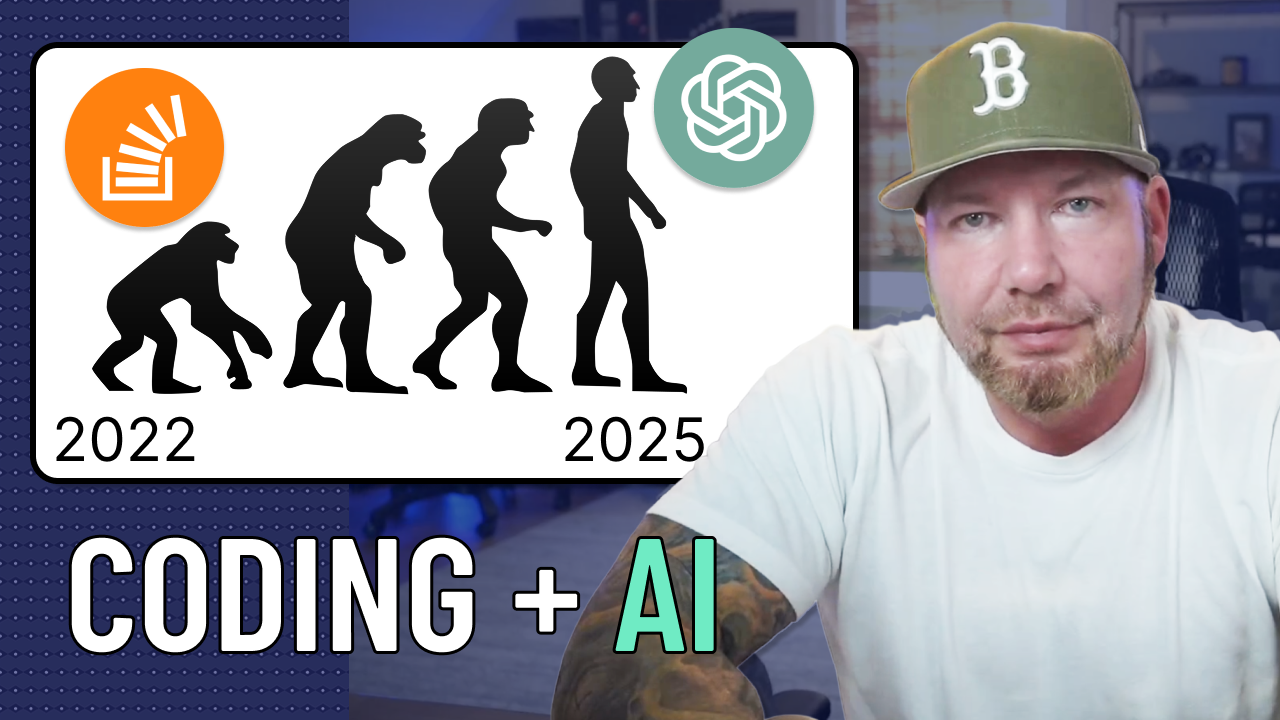Coding Before AI Wasn't The Stone Age
Oct 28, 2025
A recent narrative suggests that software development has undergone a revolution due to AI advancements, particularly in the last few years. Let's unpack this idea, especially the claims that imply we’ve moved from a primitive coding era into a new age of AI efficiency. The reality is more nuanced than that.
Check the video out or keep reading
Myth: We wrote every line of code ourselves
The idea that developers were manually typing every line of code up until yesterday is a gross oversimplification. Even three years ago, developers were not coding in isolation. They utilized numerous resources:
- Code snippets and templates: These have been available for years, helping to speed up the coding process.
- Stack Overflow: A treasure trove of tested solutions that developers have used to troubleshoot and refine their work.
- Open-source code on GitHub: A vast repository of shared knowledge and examples from other developers.
- Package managers: Tools that allow for the installation of libraries without needing to delve into their inner workings.
- Boilerplate generators: Command-line tools that scaffold entire projects, saving time and effort.
- Intelligent IDE autocompletion: Tools that have significantly improved over the years, reducing the likelihood of typing errors.
Being resourceful is an inherent part of a developer's job. Relying on existing solutions has always been a hallmark of good coding practices.
Myth: Spending hours fixing missing semicolons
This claim borders on offensive to seasoned developers. While it may be hyperbolic, it misrepresents the reality of coding practices. Tools like ESLint and Prettier have been around for years, catching syntax errors like missing semicolons before a file is saved. If anyone is genuinely spending hours on such trivial issues, it likely stems from a fundamental misunderstanding of their development tools rather than a flaw in the tools themselves.
Claim: Searching Stack Overflow was tedious
This point reflects a misunderstanding of the value that Stack Overflow provides. Although AI can deliver answers quickly, it lacks the nuanced, community-driven discussions that Stack Overflow offers. The platform enables:
- Vetted answers: With upvotes indicating helpfulness.
- Multiple approaches: Different developers may offer varied solutions to the same problem, enriching understanding.
- Contextual learning: Real developers share insights on edge cases and reasoning behind solutions.
While AI can provide immediate answers, the depth of understanding gained from engaging with community discussions is irreplaceable.
Myth: Deploying was a gamble
The notion that developers were deploying code to production with fingers crossed is misleading. The practice of maintaining staging environments has been standard for years. By the mid-2010s, tools such as Docker enabled consistent environments, effectively mitigating the dreaded 'works on my machine' syndrome. Continuous Integration and Continuous Deployment (CI/CD) practices became standard, ensuring that code had to pass all tests before deployment. Claiming otherwise might sound good on Twitter but does not reflect the reality of professional development in 2022.
The Evolution of AI in Development
AI's role has certainly expanded in recent years, leading to the perception that it's a game-changer. However, this shift presents several new challenges:
- AI code generation: While convenient, it can lead developers to copy-paste solutions without understanding them, risking technical debt.
- Error explanations: AI may provide contextual error messages, but intelligent IDEs have been doing this for a while. Developers need to engage with these messages rather than rely solely on AI.
- Documentation: AI transforms static manuals into conversational experiences, yet not all users fully utilize this feature, often opting for quick fixes instead of genuine understanding.
- Single-command deployments: This has been standard for years with tools like Vercel and Heroku. The simplicity of deployment is not a recent phenomenon.
How to Use AI Responsibly in Development
AI tools can complement development practices, but they should be used wisely. Here are practical guidelines:
- Understand the fundamentals: Do not let AI replace foundational knowledge. Keep coding without assistance to reinforce skills.
- Leverage AI for routine tasks: Use AI for boilerplate code and repetitive tasks, but ensure you understand the underlying logic.
- Engage with community resources: Continue to consult platforms like Stack Overflow for deeper insights and varied problem-solving approaches.
- Review AI-generated code: Always check AI suggestions before integrating them into your project to avoid potential pitfalls.
- Prioritize learning over quick fixes: Use AI as a learning tool, asking follow-up questions to enhance understanding rather than merely seeking immediate solutions.
Final Thoughts
AI undoubtedly enriches the coding landscape, yet its arrival should not overshadow the foundational practices that have shaped development over the years. The idea that development went from chaotic to streamlined overnight ignores the incremental improvements that have consistently enhanced our workflows.
We must maintain perspective; while AI can assist in making processes smoother, it does not render previous methods obsolete. The risk lies in novices believing they can bypass learning the core concepts of coding because AI will 'handle' it for them. The truth is, understanding the past is crucial to shaping a more informed future in development. As we move forward, let’s embrace AI wisely while valuing the essential skills that laid the groundwork for today’s technologies.
Stay connected with news and updates!
Join our mailing list to receive the latest news and updates from our team.
Don't worry, your information will not be shared.
We hate SPAM. We will never sell your information, for any reason.

